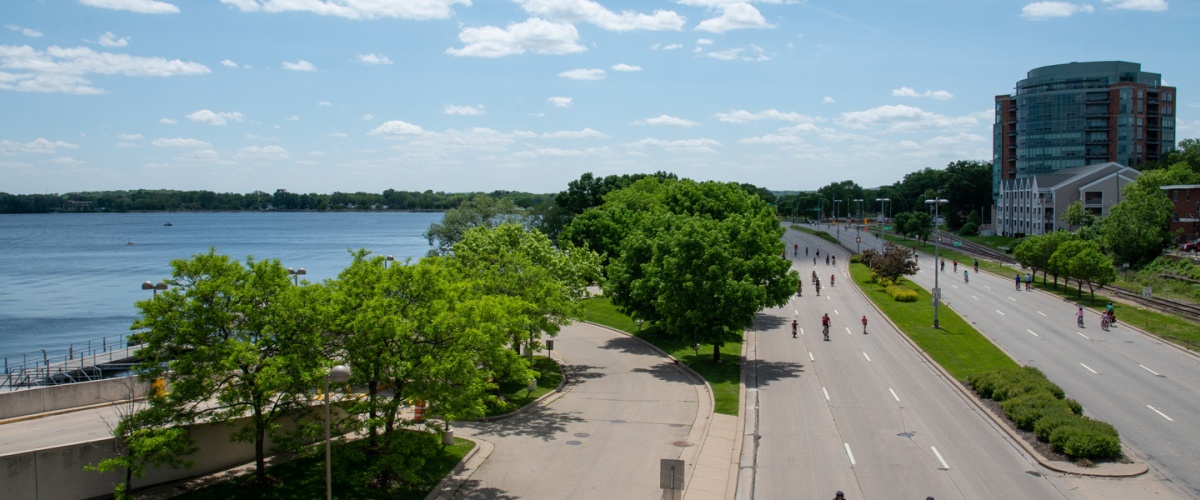
Madison Businesses and Residents Make Cool Choices for a Green Madison
Employees at over 40 Madison businesses will take part in an 8-week online competition to reduce energy use
Green Madison, a city-wide effort to reduce energy consumption and win the $5 million Georgetown University Energy Prize, launches a new city-wide game-based approach to reducing energy use on Monday, September 28th.
Starting Monday, Madison residents--including employees from more than 40 diverse Madison businesses and organizations, including UW Health, American Family Insurance, MG&E, TDS Telecom, and the Greater Madison Chamber of Commerce will take part in Cool Choices, an online sustainability game that encourages sustainable behaviors like turning off the lights when leaving a room or biking instead of driving. The game platform also calculates carbon and energy savings as players log their sustainable actions on a daily basis.
"It is exciting that Green Madison has mobilized so many residents and area businesses to come together to reduce energy usage in Madison. The City is taking innovative approaches to being more green and cutting costs for government, local businesses and residents all over Madison," noted Mayor Soglin.
Everyone’s efforts in the city-wide Cool Choices game count toward Madison’s entry in the Georgetown University Energy competition.
"Madison has a secret weapon in the nation-wide Energy Prize: A game-based-impact approach that inspires and unites every Madisonian around sustainability! Cool Choices has demonstrated results, and will let residents and employees from businesses large and small communicate with each other on how to improve our city," said Dan White, CEO at Filament Games.
The "social stream" within the game platform will also promote awareness of additional Green Madison initiatives designed to help Madison residents save money. For example, via Green Madison, residents can host energy house parties to receive a free energy assessment, recommendations for practical improvements, and follow-up assistance applying for rebates on energy efficiency improvements. Green Madison is also serving as a streamlined point-of-contact to help multifamily building owners with rebate programs, free energy assessments, contractor selection, and quality assurance in partnership with Project Home and Focus on Energy. All of these initiatives help the City of Madison save money, reduce energy use, and compete to claim the $5 million Georgetown University Energy Prize.
"Employees at Reynolds Transfer & Storage are taking part in the city-wide game of Cool Choices because we see this as an easy and fun way to be more green and to help Madison reduce our energy use as we compete for the Georgetown University Energy Prize" said Benjamin Reynolds, Director of Operations at Reynolds Transfer & Storage. "We hope even more businesses and Madison residents will join in and take part." Madison residents and businesses can get involved, sign up to play Cool Choices and find more information on all Green Madison initiatives at: www.greenmadison.org
ABOUT
Green Madison
Green Madison is an effort to reduce energy consumption in the City of Madison. As part of the Georgetown University Energy Prize, Green Madison is competing against communities around the nation to determine who can reduce energy consumption the most. The winning community will earn $5,000,000 toward sustainability initiatives.
Cool Choices
Cool Choices is a Madison-based non-profit offering a game-based approach to reducing carbon emissions and inspiring employee engagement on the topic sustainability. Cool Choices has created verified energy and cost savings nationwide for a wide variety of organizations and communities.
Georgetown University Energy Prize
The Georgetown University Energy Prize challenges towns, cities, and counties to rethink their energy use, and implement creative strategies to increase efficiency. Currently, 50 small and mid-sized communities from Alaska to Florida are competing as semi-finalists to demonstrate success in reducing energy consumption over a two-year period.
